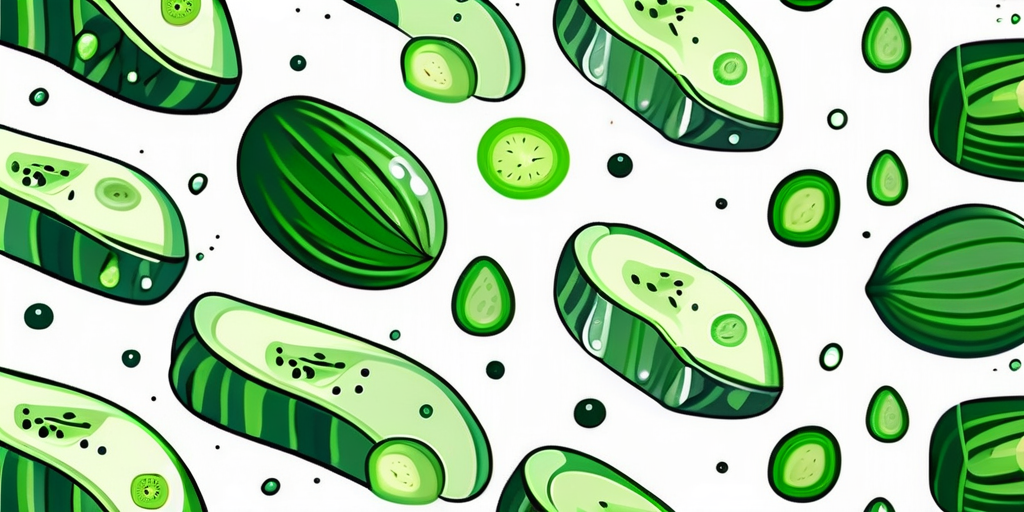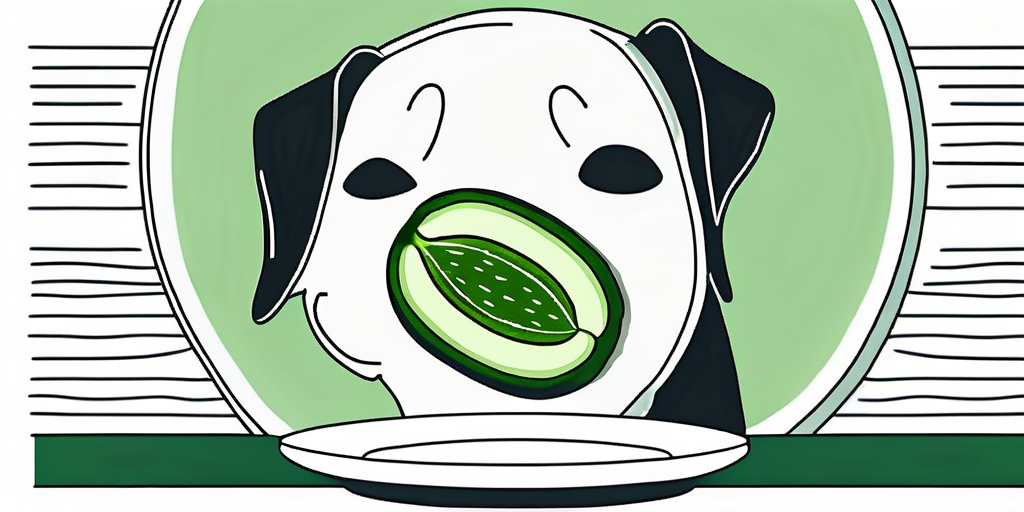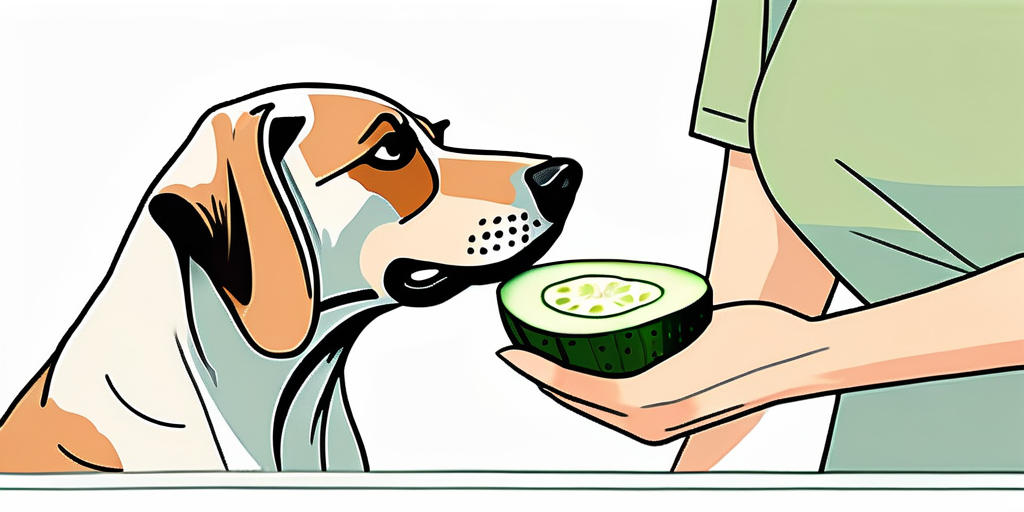Understanding a Dog’s Dietary Needs
When it comes to providing the best nutrition for our furry friends, it’s important to understand their unique dietary needs. Dogs, like humans, require a balanced diet to stay healthy and thrive. Their bodies require a combination of essential nutrients to support their overall well-being. From proteins to vitamins and minerals, each component plays a vital role in their nutrition. One food that has gained attention in recent years is cucumber. But can dogs eat cucumber?
The Canine Digestive System
To determine if cucumbers are a safe food option for dogs, it’s important to understand their digestive system. A dog’s digestive system is designed to process a variety of foods, including both animal and plant-based substances. Their digestive system is shorter and more acidic compared to humans, which allows them to process and break down tough fibers and extract nutrients efficiently.
However, dogs are primarily meat-eaters, and their bodies are adapted to digest and absorb nutrients from animal proteins effectively. While plant-based foods can provide additional nutrients, it’s important to consider the nutritional value and potential health benefits before adding them to your dog’s diet.
Essential Nutrients for Dogs
Before diving into whether dogs can eat cucumbers, let’s take a look at the essential nutrients dogs need to thrive:
- Protein: Dogs require high-quality protein sources to support muscle development and repair.
- Fat: Healthy fats are essential for energy, maintaining healthy skin and coat, and absorbing fat-soluble vitamins.
- Carbohydrates: While dogs don’t have a strict carbohydrate requirement, they can benefit from easily digestible carbohydrates for energy.
- Vitamins and Minerals: Dogs need a variety of vitamins and minerals, such as vitamin A, vitamin C, calcium, and potassium, to support their overall health.
Now that we understand the importance of these essential nutrients, let’s explore whether cucumbers can be a part of a dog’s diet. Cucumbers are low in calories and fat, making them a healthy snack option. They are also a good source of hydration due to their high water content. However, it’s important to note that while cucumbers can be a safe addition to a dog’s diet, they should be given in moderation and prepared properly.
When giving cucumbers to your dog, make sure to wash them thoroughly to remove any pesticides or dirt. It’s also important to remove the seeds and peel, as they can be difficult for dogs to digest. Slicing the cucumber into small, bite-sized pieces can make it easier for your dog to chew and digest.
While cucumbers can provide some additional vitamins and minerals, they should not replace the essential nutrients found in a balanced dog food diet. It’s always best to consult with your veterinarian before introducing any new food to your dog’s diet, especially if they have any underlying health conditions or dietary restrictions.
In conclusion, while cucumbers can be a refreshing and hydrating treat for dogs, they should be given in moderation and prepared properly. Remember to prioritize a balanced diet that includes high-quality protein sources, healthy fats, and other essential nutrients to ensure your furry friend’s overall well-being.
The Nutritional Profile of Cucumbers
Vitamins and Minerals in Cucumbers
Cucumbers are known for their high water content, which can help keep dogs hydrated. Additionally, they contain various vitamins and minerals that can contribute to a dog’s overall health. Cucumbers are a good source of vitamin K, vitamin C, and potassium. These nutrients play a crucial role in maintaining healthy bones, supporting the immune system, and regulating blood pressure.

Hydration Benefits of Cucumbers
One of the significant benefits of cucumbers for dogs is their high water content. Staying hydrated is essential for dogs, especially during hot summer months or periods of physical activity. Adding cucumbers to their diet can provide an extra source of hydration, helping to prevent dehydration and promote optimal bodily functions.
But did you know that cucumbers also contain other essential vitamins and minerals that can benefit your furry friend? In addition to vitamin K, vitamin C, and potassium, cucumbers also provide a good amount of vitamin A and magnesium. Vitamin A is essential for maintaining healthy vision and promoting cell growth, while magnesium plays a vital role in muscle and nerve function.
Furthermore, cucumbers are low in calories and fat, making them an excellent choice for dogs who need to watch their weight. The high water content of cucumbers can help dogs feel full and satisfied without consuming excessive calories. This can be particularly beneficial for dogs on a weight management program or those prone to obesity.
Potential Health Benefits of Cucumbers for Dogs
Weight Management and Cucumbers
If weight management is a concern for your dog, cucumbers can be a useful addition to their diet. Cucumbers are low in calories and high in water and dietary fiber. These factors can help dogs feel full without adding excessive calories to their diet. Including cucumbers as a healthy snack or a part of their regular meals can aid in weight management and prevent overeating.

Skin and Coat Health
Healthy skin and a shiny coat are signs of a well-nourished dog. Cucumbers contain silica, a mineral known for its ability to promote collagen production. Collagen is essential for maintaining healthy skin, joints, and connective tissues. Including cucumbers in your dog’s diet can contribute to a lustrous coat and help alleviate certain skin conditions.
But did you know that cucumbers can also provide additional health benefits for your furry friend? It’s true! Cucumbers are not only a refreshing and hydrating treat, but they also offer a range of other advantages that can improve your dog’s overall well-being.
One of the lesser-known benefits of cucumbers is their ability to support proper hydration. As mentioned earlier, cucumbers are high in water content, making them an excellent choice for keeping your dog hydrated, especially during hot summer months or after vigorous exercise. Proper hydration is crucial for maintaining healthy bodily functions, including digestion, circulation, and temperature regulation.
Furthermore, cucumbers are packed with essential vitamins and minerals that can contribute to your dog’s overall health. They are a good source of vitamin K, which plays a vital role in blood clotting and bone health. Additionally, cucumbers contain vitamin C, an antioxidant that helps boost the immune system and supports collagen production, aiding in wound healing and tissue repair.
Possible Risks and Precautions
Choking Hazards and Cucumbers
When feeding cucumbers to your dog, it’s important to take precautions to minimize the risk of choking. While cucumbers are generally safe for dogs to eat, some dogs may have a tendency to swallow large chunks without chewing them thoroughly. This can lead to a potential choking hazard. To prevent such incidents, it’s recommended to cut cucumbers into small, bite-sized pieces or consider grating them before serving to your dog.
Additionally, it’s crucial to supervise your dog while they are enjoying their cucumber treat. This way, you can ensure that they are eating the cucumbers in a safe and controlled manner. By being present, you can intervene immediately if you notice any signs of choking or discomfort.
Allergic Reactions to Cucumbers
While rare, some dogs may have an allergic reaction to cucumbers. Signs of an allergic reaction can include itchiness, hives, swelling, vomiting, or diarrhea. If you notice any of these symptoms after feeding your dog cucumbers for the first time, it’s best to consult with your veterinarian to rule out any potential allergies and discuss suitable alternatives.
It’s important to note that allergic reactions can vary in severity. In some cases, a mild reaction may only cause slight discomfort, while in others, it can lead to more serious complications. Therefore, it’s always better to err on the side of caution and seek professional advice if you suspect an allergic reaction.
Remember, every dog is unique, and their tolerance to certain foods may differ. While cucumbers are generally considered safe for dogs, it’s essential to be aware of potential risks and take necessary precautions. By being mindful of choking hazards and monitoring for any signs of allergies, you can ensure that your furry friend can enjoy their cucumber treat without any adverse effects.
How to Safely Introduce Cucumbers into a Dog’s Diet
Serving Suggestions for Cucumbers
Once you’ve decided to include cucumbers in your dog’s diet, there are various ways to incorporate them safely:

- Wash the cucumbers thoroughly to remove any potential pesticides or contaminants.
- Consider removing the skin, as it may be difficult to digest for some dogs.
- Cut the cucumber into small, manageable pieces to prevent choking hazards.
- Offer cucumbers as a standalone snack, mix them into your dog’s regular meals, or use them as healthy treats.
Monitoring Your Dog’s Reaction to Cucumbers
As with any new addition to your dog’s diet, it’s essential to monitor their reaction and overall well-being. Start by introducing small amounts of cucumbers and observe how your dog responds. If your dog experiences any digestive upset or allergic symptoms, discontinue feeding cucumbers and consult with your veterinarian for further guidance.
As a responsible pet owner, it’s crucial to make informed decisions about what you feed your dog. While cucumbers can provide certain health benefits when introduced appropriately, it’s always best to consult with your veterinarian before making any significant changes to your dog’s diet. By understanding your dog’s unique dietary needs and ensuring their nutritional requirements are met, you can help them live a happy and healthy life.
